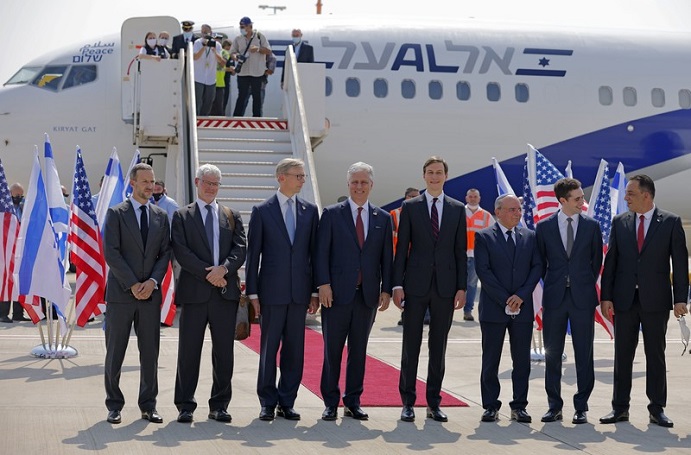
Tamara Nassar
The Electronic Intifada / August 31, 2020
Israel’s national airline El Al flew its first commercial flight from Tel Aviv to Abu Dhabi on Monday.
This came as the United Arab Emirates issued a decree on Saturday ending its formal – though often breached – boycott of Israel.
This follows last month’s agreement to normalize relations between Israel and the United Arab Emirates.
But it’s hardly the first flight between the two capitals.
Much like that US-brokered “peace” agreement, the flight formalizes already existing relationships.
Two flights travelled directly from Abu Dhabi to Tel Aviv in May and June supposedly carrying coronavirus aid for Palestinians, which the Palestinian Authority said it rejected.
Peace washing
El Al flight 971 – numbered after the UAE’s area code – was operated using a Boeing 737 aircraft named Kiryat Gat, after a city in southern Israel.
The word “peace” was painted over the name of the aircraft in English, Arabic and Hebrew.
Irony was not lost on social media users who pointed that the city of Kiryat Gat was built over the ruins of the Palestinian villages of Iraq al-Manshiyya and al-Faluja that were ethnically cleansed by Zionist militias in 1948 and 1949.
The image serves as a metaphor for how normalization between Israel and the United Arab Emirates is consolidating Israel’s dispossession of Palestinians rather than doing anything to restore their rights or bring peace.
Flying over Saudi Arabia
The El Al flight passed over Jordan, which has a peace treaty with Israel, and Saudi Arabia, which does not.
Prime Minister Benjamin Netanyahu made a phone call to the flight while it was in Saudi airspace.
Netanyahu invited the UAE to make a reciprocal official visit to Israel.
The flight was carrying Israeli and American officials and Israeli journalists.
The Israeli delegation was headed by Meir Ben-Shabbat, Israel’s national security adviser and included officials from the foreign ministry.
The US delegation was led by Jared Kushner, President Donald Trump’s son-in-law and chief architect of the US Middle East “peace” plan.
He was accompanied by National Security Adviser Robert C. O’Brien and Middle East envoy Avi Berkowitz.
The delegations will spend two days in the UAE discussing agreements on aviation, tourism and the economy.
It is no small irony that while El Al is free to fly in Saudi and Emirati skies, Qatar Airways remains banned from their airspace due to the ongoing rivalry among the Gulf regimes.
Sale of warplanes
The United Arab Emirates tried to spin its agreement to normalize relations as an exchange for Israel suspending plans to annex large swaths of the occupied West Bank.
It was in fact the United States that put Israel’s annexation plans on hold weeks before, and Netanyahu reaffirmed his commitment to annexation shortly after the announcement of the normalization agreement.
During a press briefing on the flight, Kushner reaffirmed that in regards to annexation, Trump “likes to keep his options open” and “likes to keep as much flexibility as possible when there’s no reason to give it up,” according to Haaretz reporter Noa Landau, who was on board.
In exchange for the agreement, the United Arab Emirates is seeking to purchase F-35 warplanes from the United States with Israel’s blessing.
But Israel has so far refused to give the sale a greenlight.
Tzachi Hanegbi, a senior Likud minister and close ally of Netanyahu, said his government opposed the sale of “even one screw” of the F-35 to the UAE.
The F-35 is made by US arms giant Lockheed Martin, one of the biggest beneficiaries of US military aid to Israel and a primary focus of the Palestinian-led boycott, divestment and sanctions (BDS) movement.
Israel received its first delivery of the $100-million per unit warplanes in December 2016 after the Obama administration agreed to the sale.
An Emirati military delegation even reportedly visited Israel to see its F-35s in operation.
Israel remains the only military in the region to operate the warplane.
On the flight to Abu Dhabi, Kushner said that Trump and Netanyahu will discuss the possible sale of the F-35 to the UAE, Haaretz reported.
The United Arab Emirates and Israel have clandestine ties dating back to the 1990s.
Those early ties came about because at the time the UAE wanted to buy advanced American warplanes but feared Israel might press Washington to reject the sale.
Yitzhak Rabin, Israel’s prime minister at the time, raised no objections to the sale of American fighter jets to the UAE.
Israeli and US officials met with Anwar Gargash, the Emirati minister of state for foreign affairs, upon arrival to Abu Dhabi on Monday.
The “Israel in the Gulf” Twitter account, which calls itself Israel’s “virtual embassy” in the region, posted a picture of Gargash and Alon Ushpiz, the director-general of Israel’s foreign ministry:
Mariam bint Mohammed Almheiri, another Emirati minister, said she spoke on Sunday with Israel’s agricultural minister Alon Schuster to discuss cooperation between the two countries.
Israel’s agriculture ministry has been one of the main conduits for funding Israel’s illegal colonies on stolen Palestinian land in the occupied West Bank.
UAE ends boycott
The Emirati government issued a decree on Sunday nullifying the country’s official boycott of Israel.
Yet despite the formal boycott, the two countries have cooperated on technology, military and espionage.
Israeli foreign minister Gabi Ashkenazi praised the end of the boycott as a “historic decision” and called on other countries to “follow the UAE’s brave footsteps.”
Ashkenazi was the army chief of staff during Israel’s 2008-2009 attack on Gaza, during which the Israeli military killed some 1,400 Palestinians, mostly civilians, and more than 300 children.
That hasn’t stopped Emirati ministers from welcoming him with open arms.
Tamara Nassar is an assistant editor at The Electronic Intifada












